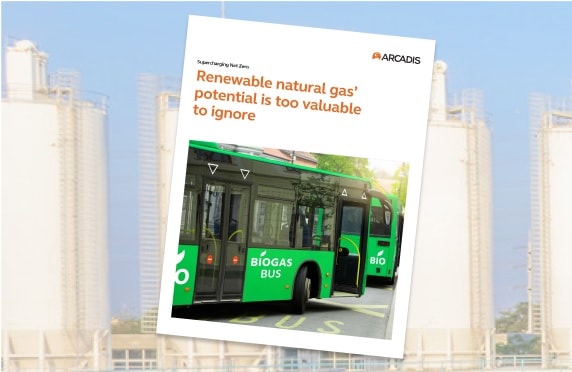Oil and gas
RNG could help honor sustainability commitments. It could also be used to harvest revenue around companies’ fleet transitions and adoption of cleaner fuel alternatives.
Green energy is on its way, but limitations in current technology, coupled with the timelines and costs for implementation, make full electrification unachievable in the near term. Renewable natural gas (RNG), also called biogas, could be the gateway to a smooth energy transition. Cleaner than traditional fossil fuels and more cost-effective than electric, RNG’s evolving value chain is primed with new possibilities.
RNG can be sourced many ways: organic food waste, agricultural waste, landfills, wastewater treatment plants and other organics. How organizations ultimately use it should depend on what provides the most value. The science around RNG is ripe with financially viable opportunities that are going unexplored. Seizing them will be crucial to bridging the gap to a green future.
RNG value opportunities:
One area seeing a marked shift in the approach to RNG is water resource recovery facilities (WRRFs), which have been using biogas from anaerobic digestion to meet on-site thermal demands and as a fuel for on-site electricity generation for years. There are more than 600 WRRFs using anaerobic digesters as an energy resource in the U.S., with about a third generating electricity for onsite operations.
Relationships with the RNG value chain will vary across and within industry sectors. Areas that work with organics, such as food and beverage, could become RNG sellers. Companies that consume a lot of fuel and/or emit greenhouse gases can buy RNG to offset energy costs, reduce carbon footprints and strengthen the resilience of power supply chains.
RNG could help honor sustainability commitments. It could also be used to harvest revenue around companies’ fleet transitions and adoption of cleaner fuel alternatives.
RNG can be used to create more environmentally friendly feedstock, allowing organizations to maintain production with less worry about fossil fuel dependence and its adverse effects on the environment.
Many farms already use biogas-to-electricity, but rising demand for pipeline/vehicle quality RNG could encourage them to make more money creating RNG.
In the U.S., municipal solid waste landfills contribute around 15% of human-related methane emissions – the third-largest source behind gas and petroleum networks and enteric fermentation (e.g. digestive gases from cattle). That gas can be a significant energy resource that accelerates clean energy efforts.

RNG is a valuable gateway to green energy
Too few organizations realize they sit on the RNG value chain – let alone tap into it. The evolving science around what RNG can deliver in sustainability, resilience and revenue is too great to ignore. As we transition toward a green future, RNG must have its place in the toolbox. Without it, we may miss out on the promising health and environmental potential that broad electrification
Supercharging Net Zero


